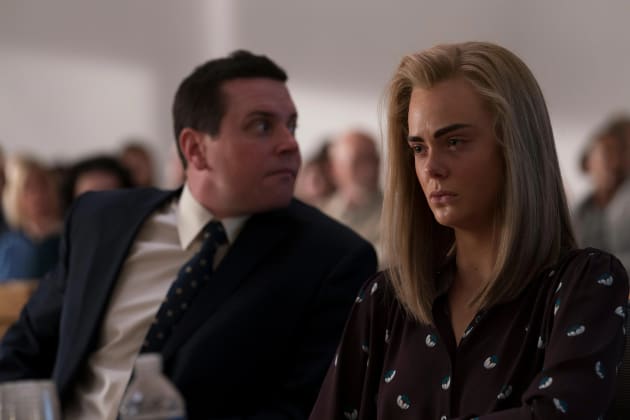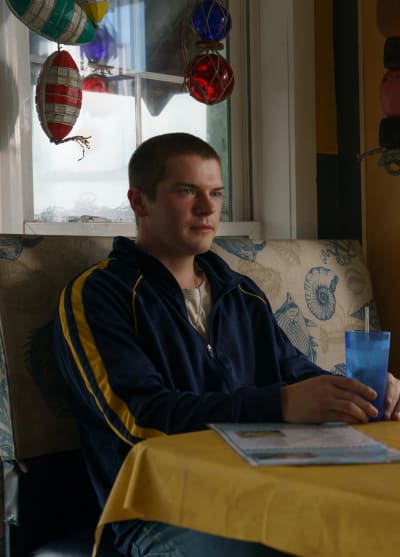The Girl From Plainville can’t be called entertaining. The subject is too traumatic to be viewed that way. But it is very good.
It is a ripped-from-the-headlines fictionalized take on the shocking true story of Michelle Carter’s seemingly callousness toward the boy she thought she loved as he struggled with suicidal thoughts, ultimately taking her life, but it is anything but harmful to those involved.
Liz Hannah and Patrick Macmanus have crafted a compassionate and tender story about two teens struggling with issues on a collision path where one of them, Conrad “Coco” Roy, wound up dead.
From HBO’s Winning Time: The Rise of the Lakers Dynasty to NBC’s Something About Pam to other Hulu series, including Pam & Tommy and The Dropout, scripted versions of headline-making stories are all over the scripted market this season, to varying degrees of success.
Interestingly, these stories power on without buy-in from the real-life people at their forefront. In that respect, creators and writers need to treat them with respect.
In the case of Winning Time, The Dropout, and Pam & Tommy, those involved are used to the spotlight. That doesn’t mean they don’t deserve respect, but at least they have learned how to weather any potential storms.
The Girl From Plainville examines the fallout of a tragic suicide involving two star-crossed teens without the proper resources to help them see that high school won’t define them. They were ordinary kids in extraordinary circumstances that ripped their families to shreds.
What made this story a sensation was how Michelle seemed to disregard Conrad’s pleas for help. The Girl From Plainville suggests that she was also mired in the drama teens suffer, such as being lonely, seeking friends, and hoping for a love the likes of which they see glorified on TV.
Prior to meeting Conrad and long after, Michelle dealt with her mental anguish with over-exercise and other eating-disorder traits.
Conrad had already attempted suicide once before meeting Michelle. At that age, suicide can be glamorous, a way out from the pain teens imagine will never end.
While they could have found support and understanding from each other that would have found their issues taking a turn for the better, that didn’t happen.
At first, Michelle relishes having a “boyfriend,” albeit one neither her family nor friends know much about until after his death. After a brief meeting far from home, the two gravitated toward each other in text messages, their communication focusing primarily on what brings them down.
The longer the pair are connected, the direr their circumstances become. Michelle puts on a brave face, continually hoping to catch the attention of the girls at school, while Conrad can’t find joy in even the sweetest moments he shares with his family.
In Michelle, Conrad finds an ear sympathetic to his plight. She doesn’t talk him out of his suicidal thoughts. For a while, she gamely tries to get him to see why it’s not the option, but she never comes straight out to say he shouldn’t do it.
The longer it persists, the more Michelle sees it as an opportunity. She watches scenes from Glee when Rachel sings Make You Feel My Love after Finn (and Leah Michele’s real love, Cory Monteith) died. She begins to believe that Conrad will be at rest, and she will finally have a way to reach those she wants to see her.
As with any case of this nature, nothing is as black and white as it initially seems. Hannah and Macmanus brilliantly bring both voices alive at times by imagining Michelle and Conrad’s conversations in person rather than through texts.
What can seem cold to the casual observer takes on warmth when the same words are spoken aloud and with the other in their sight. It could land gimmicky in someone else’s hands; here, it transports viewers into the minds of Michelle and Conrad, providing meaning and nuance to their thoughts and actions.
Hannah and Macmanus grasp the nature of this story and that they are dealing with ordinary people, and they give them all the respect they deserve.
The Girl From Plainville is superbly cast.
Elle Fanning is mesmerizing as Michelle, and Colton Ryan gives life to a boy’s pleas long after he’s gone. Their performances are soulful and authentic, shedding light on an unthinkable tragedy.
Fanning’s performance is just another indicator of her talent, as it is so markedly different from her Catherine on The Great as to be almost unrecognizable.
As Conrad’s mother, Lynn Roy, Chloë Sevigny does some of her best work to date. She perfectly understands Lynn’s confusion over the juxtaposition of Coco’s final day, a day they spent together on the beach, and his suicide that evening.
The Roy family is contextualized with layers of meaning as Lynn and Coco’s father, Conrad (Norbert Leo Butz), separated years earlier. It offers possible suggestions for Coco’s struggles.
The Carter family, though, is less understood, which could be an editing oversight or done purposefully to show that a teen can have grave issues even when raised in a whole, loving family.
That means that Kai Lennox and a Cara Buono don’t get the meaty material that Sevigny and Butz got, but they do a fine job with what they have.
Aya Cash and Michael Mosley play the prosecuting attorney and Michelle’s attorney, respectively, and Kelly AuCoin plays Detective Scott Gordon, who initially believes there is more to the story.
The Girl From Plainville’s compassionate writing and performances offer a side to this complicated story that was missing from original coverage.
By taking great care with the material, The Girl From Plainville accomplishes what traditional media failed to do by covering the tragedy with unexpected grace and nuance.
The Girl From Plainville premieres on Hulu with three episodes on Tuesday, March 29. Subsequent episodes will drop weekly.
Carissa Pavlica is the managing editor and a staff writer and critic for TV Fanatic. She’s a member of the Critic’s Choice Association, enjoys mentoring writers, conversing with cats, and passionately discussing the nuances of television and film with anyone who will listen. Follow her on Twitter and email her here at TV Fanatic.






